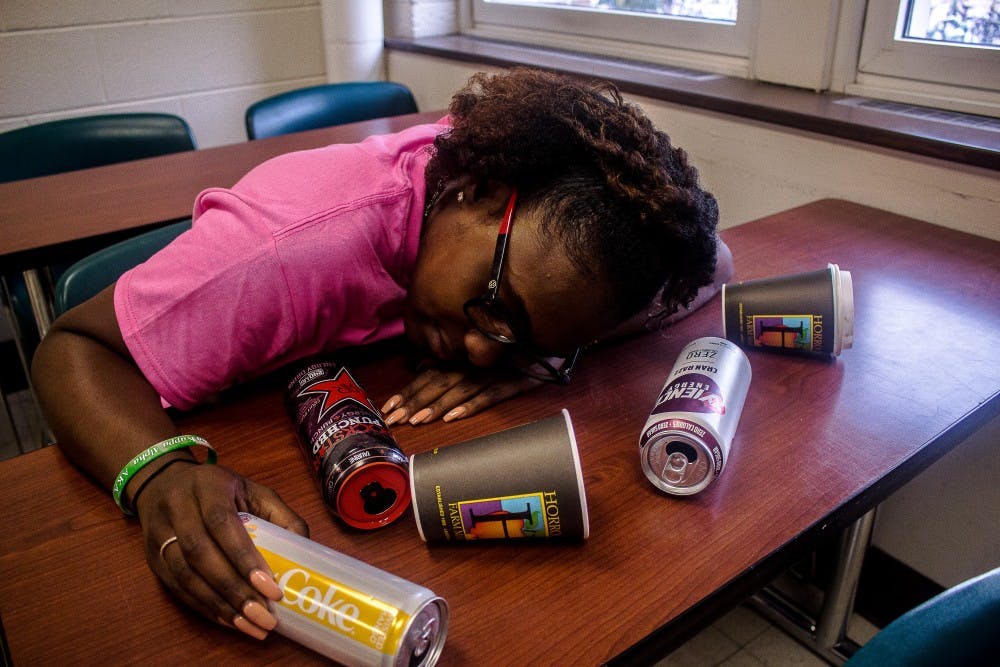Socialize, study or sleep.
Students often feel the need to give up one in order to support the other two.

Photo illustration. Psychology and criminal justice senior Brianna Harris rests her head on a desk on Oct. 10, 2018, at Berkey Hall. Balancing work, school and a social life is a challenge for many college students and often results in sleep deprivation.
Socialize, study or sleep.
Students often feel the need to give up one in order to support the other two.
This creates a negative impact on the human mind and body, according to MSU researchers. They recently conducted “the largest experimentally controlled study on sleep deprivation to date, revealing just how detrimental operating without sleep can be,” according to a press release.
MSU Associate Professor Kimberly Fenn is the director of the MSU Sleep and Learning Lab. Her research focuses on finding reasons for human error involving sleep deprivation.
“If you look at mistakes and accidents in surgery, public transportation and even operating nuclear power plants, lack of sleep is one of the primary reasons for human error,” Fenn said in the press release.
MSU students talked about their struggles to find a balance between socializing, studying and sleeping. Some said they have regularly experienced sleep deprivation and its effects.
Human biology junior Terri Bondon is taking 15 credits this semester. She said she gets about eight hours of sleep two times a week.
“I get my best sleep Tuesdays and Thursdays,” Bondon said.
Bondon has worked as a receptionist at the Kellogg Hotel and Conference Center for three years. During weeks where she had finals, she would stay up studying the whole night.
“If I feel like it’s getting too overwhelming then I’ll just take a semester off,” Bondon said. “That’s a good thing about my job. If it’s too much, they’ll allow us to take a semester off and just come back in the spring.”
Bondon said three of four times a week she would wake up but still feel tired. That led to her daydreaming in classes, but she tried not to fall asleep.
“Probably because I snore, so that would be loud,” Bondon said.
Bondon said she slept late a couple times this semester, meaning she’s missed some 8 a.m. classes.
Business freshman Lizzie Kompus used to pull all-nighters, but not anymore. Now she tries her best to get a full eight hours of sleep most nights.
“I get kind of cranky if I don’t get enough sleep,” Kompus said.
She said she learned the importance of sleep in her psychology class.
“You want to get through a couple sleep cycles when you do go to sleep,” Kompus said. “I try my best to get through those sleep cycles.”
In the press release, Fenn explained distractions humans face every day are unavoidable, but especially harmful to sleep-deprived people.
“Operating with reduced cognitive capacity has wide-ranging effects,” Fenn said. “Students may pull all-nighters and not retain information for their exams. More worrisome, individuals working critical jobs may put themselves and other members of society at risk because of sleep deprivation. It simply cannot be overlooked.”
Sociology doctoral student Mark Suchyta said he lives an hour from campus, so he has to get up at 6 a.m. for classes.
Support student media! Please consider donating to The State News and help fund the future of journalism.
“I would say two out of every seven days, (I) actually get eight hours,” Suchyta said. “Usually what I do is most nights I get like six or seven (hours).”
Suchyta used to stay up all night when he was a undergraduate student. Now he tries not to do that because he would feel terrible for days afterward.
“I stopped doing all-nighters so I don’t stay up anymore,” Suchyta said. “I just try to remind myself that work’s not the only thing you do. You have friends to see, family to keep up with and you’ve got to take care of yourself.”
Suchyta said he now realizes something he never thought of when he was younger: How important it is to manage other aspects of his life besides school and work.
“I’m just realizing the importance of learning those skills,” he said. “I think people should try to pay more attention to that because I know it’s benefited me a lot.”